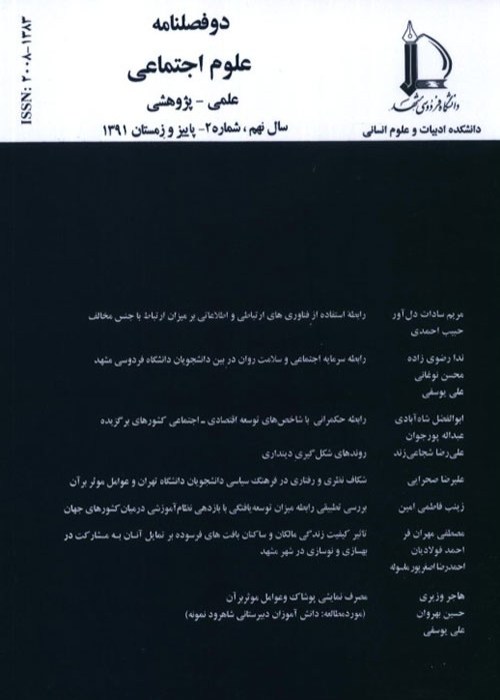Religion and Happiness: A Study on the Relationship between Religiosity and Happiness in a Sample of University Students
Author(s):
Abstract:
Introduction
The current survey has been conducted with the aim to examine the relation between religiosity and happiness. For this purpose the relation between the extent of religiosity and happiness has been studied and examined.In this study religiosity (extent and type) is an independent variable. The extent of religiosity has been measured using Glock and Stark's model and in 4 aspects of faith, experience, result and rituals. Social support, life meaningfulness, and adaptation with frustration and deprivation have been used as intermediate variables, each of which were measured using 7, 11 and 11 phrases, respectively. Happiness is a dependent variable which is measured using Oxford's standard measures and in 29 phrases.
Theoretical Framework: In order to explain the relationship between religiosity and happiness three sets of theoretical studies were used. 1. The views of functionalist sociologists of religion, like Webber, Yinger, Girtz, Luckman, Berger and Odie. 2. Some theorists and thinkers in the scope of happiness, like Cheloby and VinHoven, consider a series of variable which are influential in the increase of happiness levels, and religiosity through its connection with these variables can cause happiness levels to rise. 3. Furthermore, some thinkers and researchers have directly examined and explained the relation between these two (religiosity and happiness) in various researches and reached conclusions; like the theoretical studies of Lim and Putnam, Headey, Kozaryan, etc; which are reviewed thoroughly in the theoretical section of the study.
By examining the theories it was identified that religiosity strengthened peoples happiness by increasing social support, giving meaning to the individuals life, and strengthening mental and social readiness for facing frustration and deprivation. Based on this model, the hypotheses of the study are: 1- More religious people have higher social support. 2. People with higher social support are happier. 3. More religious people have more meaning in their life. 4. People with meaningful lives are happier. 5. More religious people adapt to frustrations and deprivations better. 6. People who adapt to frustrations and deprivation better are happier. 7. More religious people are happier.
Method
The study was conducted as a survey and the data was gathered from questionnaires. The population of the study were the students of Kharazmi Universitys Karaj campus from which a sample of 371 students were selected using Cocrans sampling formula and proportional stratified method.Results
The description of the studies variables are presented based on the mean of each variable. In this way that the scope of the scores for each variable are converted to 1 to 3 and then the mean score of each variable is reported. According to the descriptive results of the study, the mean of the variables are as follows: religiosity 2.43; social support 2.74; life meaningfulness 2.38; adaptation to frustration and deprivation 2.01; happiness 1.88.For examining and testing the relations of the study's variables Pearsons correlation test, cross tables, two variable regression multi variable regression and path analysis were used. The results of Pearsons correlation test show that a significant positive correlation exists between religiosity and the studies intermediate variables (social support, meaningfulness of life, and adaptation to frustration and deprivation) and dependent variable (happiness). Also the results of the multi variable regression show that independent variables (extent of religiosity, social support life meaningfulness, adaptation to frustration and deprivation) approximately describe 50.5% of the total changes in the dependent variable (happiness). Furthermore, the effect of religiosity on happiness was significantly negative (in contrast with the results of Pearsons correlation). The results of path technique show that religiosity can have a positive effect on happiness through the intermediate variables of social support, meaningfulness of life, and adaptation to frustration and deprivation and can have a negative effect on happiness and practically decrease peoples happiness levels by creating a series of variables that were not considered in this study.
Conclusion
It can be stated that religiosity can have a significant positive effect on peoples happiness by providing mechanisms like bringing meaning to peoples lives, creating a network of social relationships, providing social support, providing justifications for frustrations and deprivation that might occur in the individuals life and adapting him to these frustrations and deprivations. Otherwise without considering the role of the intermediate variables, i.e. meaningfulness of life, social support and adaptation to frustrations and deprivation it can even have a relatively weak effect on peoples happiness. In fact, religiosity can have a negative effect on happiness and practically decrease peoples happiness level by developing a series of variables including creating a kind of obsession and fear of sin and its punishments, creating world aversion in the individual and creating dependency and lower levels of self-flourishing, inflexibility, dogmatism and tyranny.It can be stated that religion still plays an unmatched role in peoples lives (giving meaning to life) which other institutions like family, government and etc. are incapable of therefore they cannot replace religion and until religion plays this incomparable role it will still exist.
Keywords:
Language:
Persian
Published:
Journal of Social Sciences, Volume:13 Issue: 1, 2016
Pages:
27 to 48
magiran.com/p1613202
دانلود و مطالعه متن این مقاله با یکی از روشهای زیر امکان پذیر است:
اشتراک شخصی
با عضویت و پرداخت آنلاین حق اشتراک یکساله به مبلغ 1,390,000ريال میتوانید 70 عنوان مطلب دانلود کنید!
اشتراک سازمانی
به کتابخانه دانشگاه یا محل کار خود پیشنهاد کنید تا اشتراک سازمانی این پایگاه را برای دسترسی نامحدود همه کاربران به متن مطالب تهیه نمایند!
توجه!
- حق عضویت دریافتی صرف حمایت از نشریات عضو و نگهداری، تکمیل و توسعه مگیران میشود.
- پرداخت حق اشتراک و دانلود مقالات اجازه بازنشر آن در سایر رسانههای چاپی و دیجیتال را به کاربر نمیدهد.
In order to view content subscription is required
Personal subscription
Subscribe magiran.com for 70 € euros via PayPal and download 70 articles during a year.
Organization subscription
Please contact us to subscribe your university or library for unlimited access!



